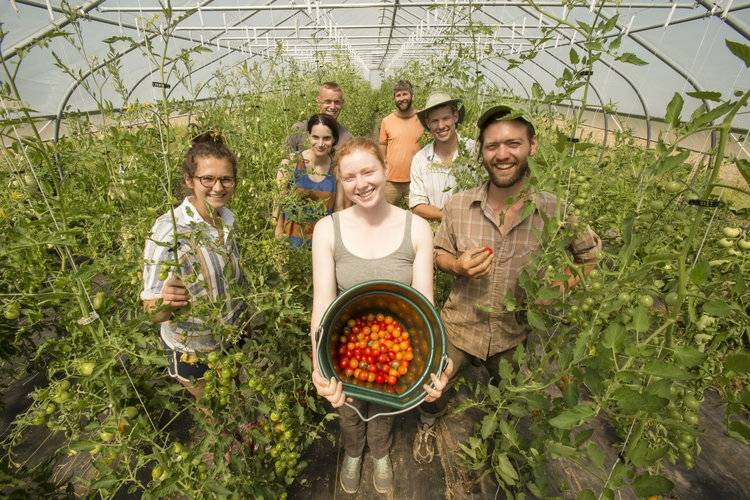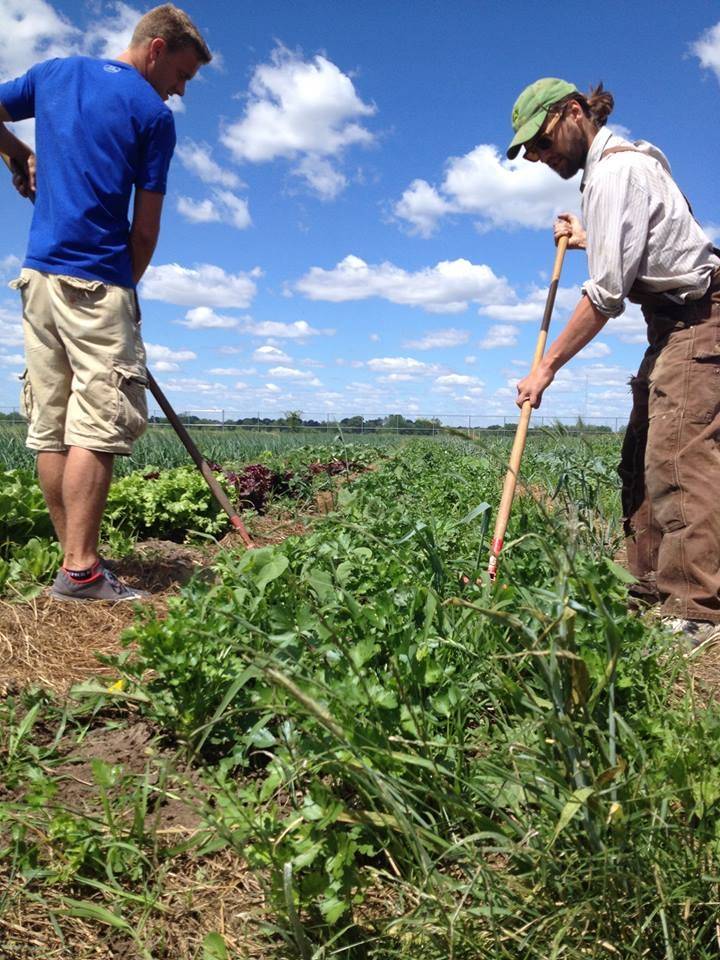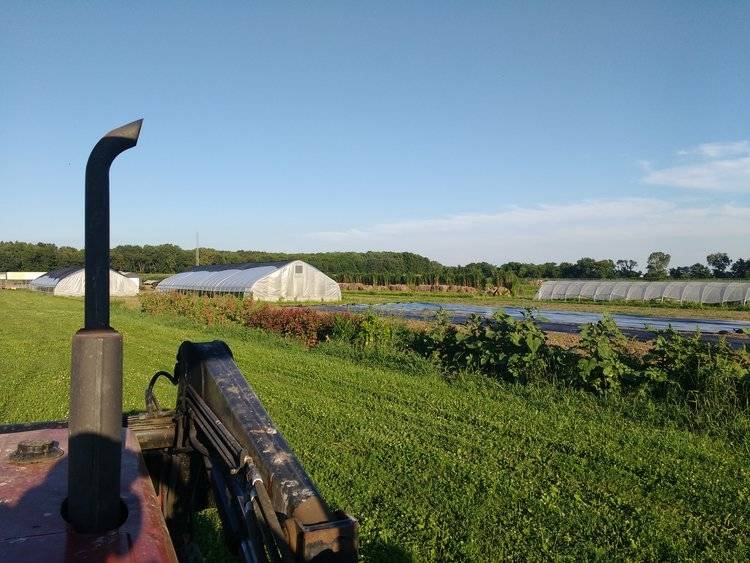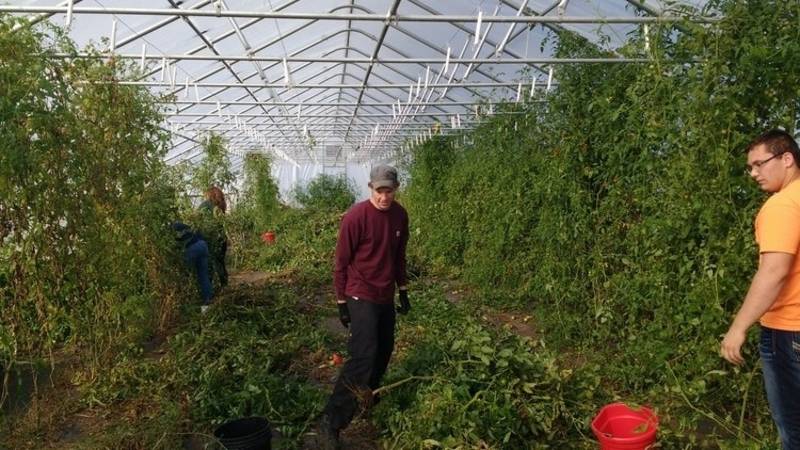On Lincoln Avenue, south of Windsor Road on a gravel drive lies a small five acre farm and three 30 by 95 foot greenhouses. A program under the Crops Sciences Department at the University of Illinois at Urbana-Champaign, the Sustainable Student Farm (SSF), produces about 30,000 pounds of produce per year, 20 percent of which is sold to the community at area farm stands. The remaining 80 percent of the farm’s crops are sold to U of I Dining Services. Matt Turino, the manager of SSF, is an Urbana native. Turino worked on a student farm while receiving his B.A. at Warren Wilson College in North Carolina before moving back to the area. Turino works to ensure that the farm runs efficiently and smoothly as is grows fresh fruits and vegetables year round. Certified by the USDA Good Agricultural Practices Program (GAP), the Sustainable Student Farm’s produce is safe and sanitary.
Founded in 2009, Turino estimates that SSF produces about 35 to 45 crops every year, with a heavy focus on vegetables. On the farm you can find anything from squash to cucumbers, carrots to beets, onions and more. Fruit crops include apple trees, strawberries, and blackberries, among others.
Three unheated greenhouses, also known as high-tunnel production, enable the SSF to provide produce to the community and university all year long. Because of their potential to allow for production in the winter months, Turino says the high-tunnels are the SSF’s most high value space. Throughout the summer 9,000 square feet of high-tunnels will be full of tomatoes and peppers that the Crop Sciences Department will then process into other food products such as tomato and hot sauce. Come winter, tomatoes and peppers will be phased out to make way for the growth of salad greens.

In all of its production, the farm aims to use low input methods of food production and promote environmentally sustainable methods of farming. High input methods, Turino says, involve using high amount of fertilizer, pesticides, and herbicides during crop production. Conversely, the SSF uses no herbicides and only organic pesticides. For fertilization, the SSF relies on organic fertilizer and the use of cover crops.
Cover crops are cereal crops such as ryes, oats, and sudangrass, planted in conjunction with legumes such as peas. By planting these cereal and legume crops together, nitrogen (an important component of healthy soil) becomes fixed within the ground. In addition, cover crops assist in the creation of organic matter as well as the prevention of erosion and weed growth, Turino explains. Every year plots are rotated out between cover crops and the crops that the farm produces for the community and university. While the SSF is not a USDA Certified Organic Farm, these methods are modeled after with USDA Standards for Organic Farming practices.
Beyond providing sustainably grown produce for the community, the SSF’s other goals are to Educate, Demonstrate, Provide, and Collaborate. Student workers and volunteers of diverse backgrounds staff the farm. In the past Art, Dance, Landscape Architecture, and other majors have come together in order to learn and develop skills in organic farming. Working year-round, students and volunteers participate in “all aspects of the production cycle, from seed-starting and transplanting to cultivation and harvesting.”

Other educational opportunities include workshops for the community and local farmers. Because the SSF is associated with the University, the farm often has access to resources and tools that local farmers may be interested in, but are not ready to purchase, says Turino. Workshops are often used as a way to showcase those products and demonstrate their potential. Other workshop topics include season extension, transplant production, and cover culture/crop rotation.
The farm also aims to demonstrate to the community that there are productive and effective methods of farming that are environmentally and economically sustainable. This is achieved with a diversity of techniques and practices, such as crop rotation and cover cropping. Collaboration occurs with other departments at the University through various projects including a few going on right now.
The SSF is working with Dining Services and Pilot Plant on the “production of large quantities of shelf-stable products- like tomato sauce- for year round use.” The farm is also working with Dr. Sam Wortman, hosting research related to biodegradable mulch and mechanical weed blasting, as well as providing materials to Fresh Press for paper production and research.
Ultimately, Turino hopes to utilize and integrate farming techniques and methods that will allow the farm to pay for itself, making it economically sustainable as well as environmentally sustainable. While Turino warns against looking at organic farming methods as the silver bullet for environmental issues such as CO2 emissions and habitat loss, he does think there are a number of ways the farm can grow, diversify, and increase its potential with organic methods and practices. Turino would like to increase the farm’s scale of production, specifically that of low maintenance plants such as onions, root vegetables, and garlic, and plants that store well such as carrots and beets. Turino faces many challenges ahead in order to achieve his vision for the farm, but he hopes to continue to learn and teach others about sustainable farming practices. He encourages anyone and everyone to learn more about the farm on its annual field day, which occurs in the fall. He urges people to support local farms, especially in this part of the country where he says organic farming has less support and is more difficult due to its unpredictable weather because “the more local farmers we support, the more robust our food system can be.”

The Sustainable Student Farm sells its produce at farm stands on campus so that it doesn’t compete with other area farmers. From May 25 to October 26 this year you can find SSF produce on the Quad on Thursdays from 10am-2pm.
SSF has also teamed up with the Meat Sciences Lab. SSF produce can be found at the Meat Sciences Laboratory (along with the Lab’s own meat and eggs) on Tuesdays from 3-5:30pm from June 6 to August 29.
For more information about the Farm, where they sell, and what they do you can visit their website or reach out at [email protected].
The Sustainable Student Farm is supported by the Crop Sciences Department, the Sustainable Student Committee, U of I Dining Services, and Fresh Press.
Photos courtesy of the Sustainable Student Farm.








